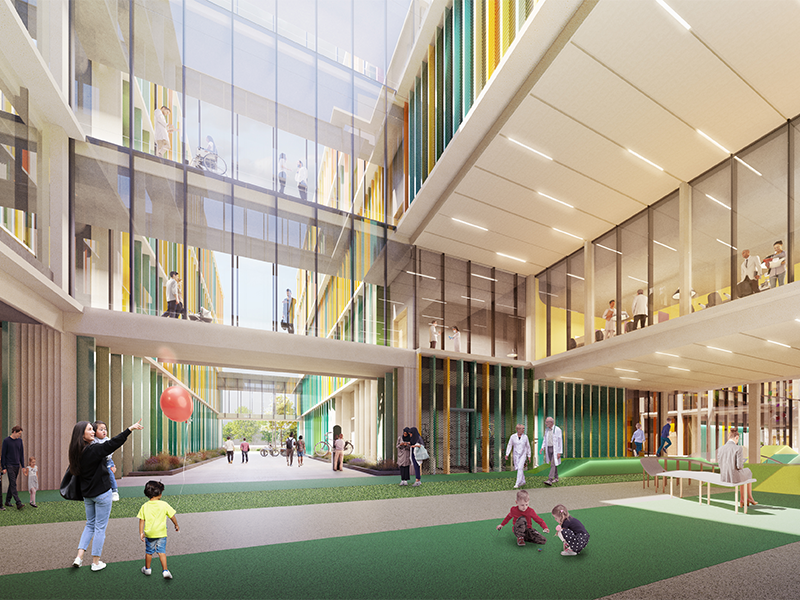In a UK first, Cambridge University Hospitals has developed life-saving virtual technology that effectively “parachutes” its consultants into other hospitals, helping fellow medics across the region care for seriously ill babies.
One of the first patients to benefit was baby Aurelia Hunt, who became seriously ill after being born prematurely at Colchester Hospital.
Rather than being transferred for treatment in Cambridge, Aurelia was safely cared for in Colchester, with her family able to stay together.

Staying in Colchester effectively meant we stayed together as a family.
James Hunt, Aurelia's father
The technology, developed at Cambridge University Hospitals NHS Foundation Trust (CUH), is a cloud-based platform called LocANTS and enables consultants in Cambridge to monitor babies remotely, so they can read their notes, examine scans and X-rays, and check readings from ventilators, infusion pumps, and other equipment.
The consultants, all part of the Paediatric and Neonatal Decision Support and Retrieval Service (PaNDR), can also control cameras and microphones fitted to workstations in other neonatal units across the region to help doctors with tough decisions.
Livestreamed data from each baby is monitored in the PaNDR control room back in Cambridge, and if a baby's condition deteriorates and is causing concern, the team can quickly transfer the baby by ambulance to a more specialised neonatal critical care unit, such as the one at CUH.
The extra layer of clinical support means more babies can be treated closer to home, which frees up paediatric and neonatal ambulance crews and critical care cots for the sickest babies.
The initiative has already been welcomed by families who know their babies are getting the right care, in the right place, at the right time, and they don’t have the expense, inconvenience, and stress of visiting a different hospital.
Addenbrooke’s and its sister hospital Rosie maternity, which together are Cambridge University Hospitals NHS Foundation Trust, are currently trialing LocANTS at Peterborough, Colchester and Ipswich hospitals.
If it is a success the hope is to roll it out across all Eastern Region hospitals, before making a bid to the NHS to implement it nationwide.
WATCH: Among the first to benefit has been James and Nicola Hunt and their baby Aurelia.
Link: https://youtu.be/NZKNnTKz7aA
James Hunt, Aurelia's father, said:
"It was a huge relief that the technology existed. Had it been different, it would have completely blown our family life for a couple weeks.
"It was hard enough already and it would have made it even harder."

The driving force behind LocANTS, which has been in development since 2017, is Addenbrooke’s deputy medical director, Dr Sue Broster, paediatrician Dr Arun Dhar, and London-based entrepreneur and IT Consultant, Ranadip Chatterjee.




Addenbrooke’s e-hospital team offered additional support - particularly around digital governance – and further help came from the University of Cambridge Judge Business School, and the Eastern Academic Health Science Network, which is the innovation arm of the NHS.


Further recognition came when the NHS innovation support team, Health Tech Enterprise, formerly known as Health Enterprise East, pitched in with a Medtech Accelerator award for the development of an innovative solution.
It has moved on considerably since being named LocANTS – the short term that originally reflecting the technology that helped locate, track and task specially-equipped ambulances in the anti-natal and paediatric transport fleet.
Dr Broster, a consultant in neonatal intensive care and neonatal transport medicine, said: “LocANTS now enables clinicians to pool their combined expertise to make difficult decisions about difficult cases in real time, even though they may be miles apart. It is in its infancy, but has the potential to become something very big.
This is a classic example of different people, with widely differing skill sets, working as a team to develop something that has the potential to be truly remarkable and solve at a stroke a lot of risks, complications and pressures associated with neonatal transport.
Dr Sue Broster
Dr Dhar, who came up with the original concept, added:
Although it has been a long time in the making, and we have drawn on the expertise of a great many people, it is absolutely worth it because LocANTS will undoubtedly save lives.
Dr Arun Dhar
“Our specialist PaNDR consultants will be able to access systems at work, at home, or anywhere else they can use their laptops. Ultimately, we hope to offer this service for children up to 16.”
Mr Chatterjee, a specialist in technical aspects of big data systems typically used for analytics, machine learning and AI, said:
I am delighted to be part of a project that levers and develops technology to create practical solutions to clinically and demographically challenging problems.
Ranadip Chatterjee
I believe there is potential to develop LocANTS even further for the benefit of patients.

Using digital technology like LocANTS to provide care to families where it is needed most is a key focus of the Cambridge Children’s Hospital, the first specialist children’s hospital for the East of England.
Video consultations and virtual monitoring will be integrated into treatment plans to support regional healthcare professionals from a distance and provide care to children and young people closer to home.

